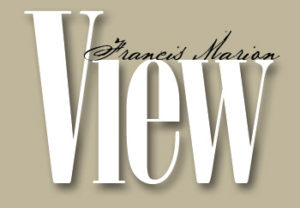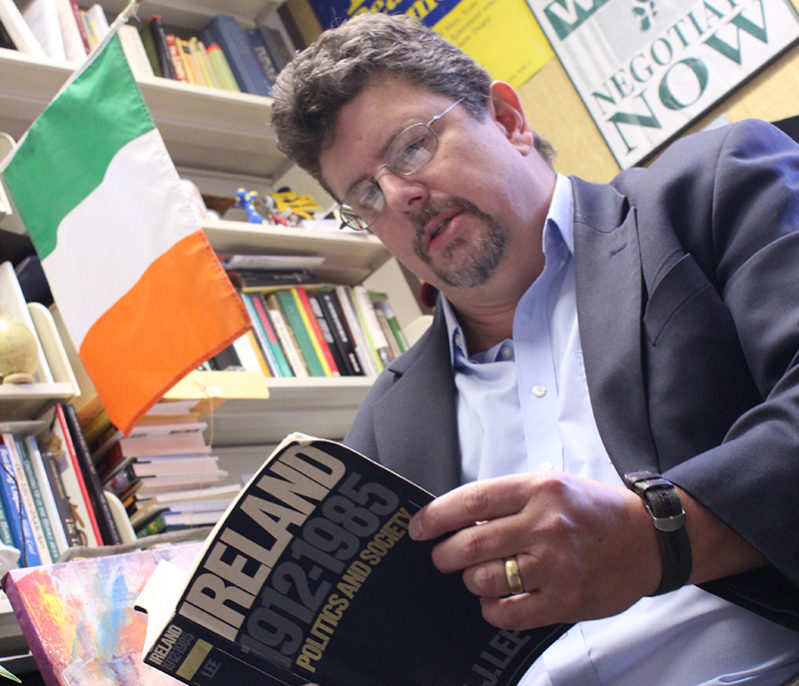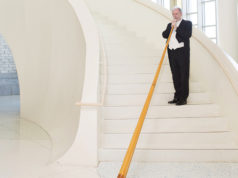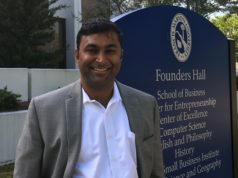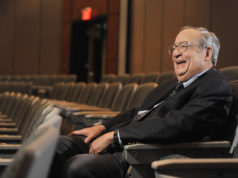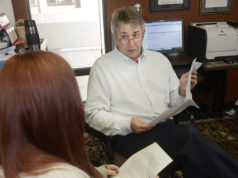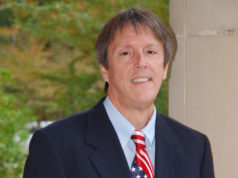His dad wanted to be an American, but Chris Kennedy couldn’t ignore his roots
A look into the mirror wouldn’t readily reveal the Irish ancestry in the bones of Dr. Chris Kennedy, chair of FMU’s History Department. No red hair or freckles here, no mischievous, leprechaun-like grin or jauntily cocked hat.
And if Kennedy’s father, David, had his way, that t’would be the end o’ it, right then and there. Though the family name, and the ancestry, are as Irish as that can get, David wanted no part of the Emerald Isle. As far back as Kennedy can remember, his father, an Irish immigrant, did all he could to disassociate both himself and his family from the culture, says Kennedy. David was an American. To make that point perfectly clear, he joined the United States Marines. David was committed to a country, all right. The good ol U.S. of A.
“My father was the last of seven sons to come from Ireland and he wanted to become as American as he could,” says Kennedy. “He didn’t like the old country.”
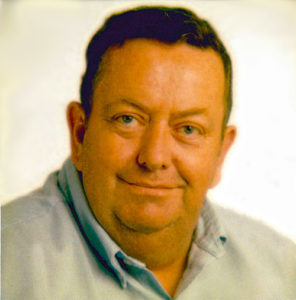
But, as much as his father pushed to sever ties with his native land, Chris Kennedy found himself propelled to embrace it.
Kennedy completed his undergraduate studies in history in December of 1989, but until that point had conducted very little research of Ireland. Ironically, it was the book, “Ireland 1912-1985: Politics and Society” written by Joseph Lee, given to him by his parents the Christmas of 1989 that prompted him to delve further into Irish sentiments during the period of the Rising.
“I assumed my father finally came around,” says Kennedy.
In the book, Lee writes, “Much probing of local research is required to establish a more precise chronology and archaeology of popular sentiment.”
This was a call to action for Kennedy who, once he completed his master’s thesis involving the study of Irish public opinion, decided to send it to the one who inspired the journey – Joseph Lee, the renowned Irish historian and author.
“On a lark, I said let me just send this off to this guy to see if he likes it,” says Kennedy. “He read it and said get your butt over here.”
And that is how he ended up in Ireland and fell into some great sources.
Pioneering research
While there, he completed his Ph.D. at the University College of Cork, giving rise to his most accomplished work, “Genesis of the Rising 1912-1926: A Transformation of National Opinion.” In the book, Kennedy analyzes public opinion in order to disprove the “turning of the tide” theory in Irish history, which asserts that British blunders in the wake of the failed Rising are what turned the tides in favor of Rebels.
While historians have said that the tide turned all at once, Kennedy’s research claims that Irish nationalism had been changing gradually since home rule was denied after being promised in 1912. As is always the case with pioneering research, Kennedy said his stand created further discussion by other scholars.
Kennedy’s research in the book was based on material that had been avoided by other historians. He says his studies revealed the true feelings of the Irish during a time when they were faced with persecution if they were open about their opinions.
The study of public opinion is complicated enough. Then, you add the turbulent era in Anglo-Irish relations from 1912-1916, and you categorically have a problem, says Kennedy.
“It’s really a contentious issue but public opinion is hard to ascertain,” says Kennedy. “What I’m saying to readers is, ‘What I’m doing is crazy but bear with me, there might be some fruit here. Traditional public opinion might not have been as accurate as what I’m trying to show.’”
Public opinion, both on an individual and collective basis, is affected by the structure of the political social hierarchy, says Kennedy.
In his research, Kennedy attempts to present material that would likely impact opinion and exploration of the spectrum of opinion, from open to more private, which was said to have been veiled, consequently which is a major part of his studies.
“The book really speaks to the fact that people will keep their true feelings private, especially in a hierarchical or conquered society,” says Kennedy. “Just as slaves aren’t going to come out and correct their masters and employees aren’t going to confront their bosses with the truth, the Irish wouldn’t reveal their true feelings to the British occupants.”
This Celtic notion has gotten him into a little trouble in the South, says Kennedy.
“The public persona here might be southern hospitality or gentile, but right behind that is their true feeling of ‘won’t those idiots from New York go home,’” says Kennedy. “And when I give talks about this in other settings, they say that it is southerners to a T.”
He believes since he arrived in Florence and joined the FMU faculty in 2006, he’s learned quite a bit about Southern culture but at the foremost of his heart is the old country of Ireland. To that end, he has presented papers both nationally and internationally, including at Saint Patrick’s College and the Marino Institute in Ireland, and the New England Historical Association.
Additionally, he has published a number of book reviews for the journal Providence: Studies in Western Civilization as well as a book, Genesis of the Rising 1912-1916: A Transformation of Nationalist Opinion (Peter Lang, 2009). His main research interests are in early modern and modern Irish history as well as the history of the British Empire.
The Irish Way
Kennedy has found a few ways to pass along his interests in the Irish culture. Besides teaching everything from European History to the French Revolution and European History since the French Revolution to Medieval Europe and Europe 1814-1914 to his students, he also assists with The Irish Way, a summer study abroad program in Ireland offered to both American and Canadian college and high school students.
In the program, students are introduced to Ireland’s magical landscape and rich customs through a variety of workshops, classes, and tours over the course of two or four weeks during the summer in Ireland. The program emphasizes culture, education, travel, safety, and fun, to ensure a unique and unforgettable journey for every student, says Kennedy. After all, he says, it is the Irish Way.
